Ear to the ground
Waking to the sound of my cat meowing and yowling for her breakfast 17 minutes before my alarm is set to jingle me awake. The bubbling of my limescale-caked kettle reaching a boil. A long, satisfying yawn leaves my lungs, passes my lips accompanied by my limbs reaching for the sky and my spine elongating as I get my body ready for the day ahead.
Jingle of keys, thunder of shop shutters clattering open, the rushing of the River Quaggy after days of downpour, wheeze and puff of pneumatic train doors opening, dulling of train passengers’ voices as my earphones plug my ear canal, the quiet swirl of my thoughts…
The clang of the gate’s iron and steel latch announces my arrival at the Paper Garden. I’m awoken to the fact that I’ve somehow boarded two trains, ridden 2 escalators, and shuffled up many stairs and…arrived.
I can feel my body tense up, bracing for what’s to come. For months now we’ve been working alongside construction company Galldris; we’ve been close neighbours, as they work on the foundations of the extension of TEDI (The Engineering & Design Institute) and we complete the build of our garden and classroom.
I take a deep breath as I step down the ramp, peering through the fence to see what machinery will be joining the airwaves today. Before I see it, I hear a digger’s tracks groan and grumble across the site, followed by the ear-piercing screech of its bucket scraping the floor.
“This is what we’re in for today,” I prepare myself as the low droning sound of another digger’s engine waiting at the other end of the site echoes in the garden.
“Focus on here, what can you hear here?” I tell myself over and over throughout the day so I can get through the disturbance I feel in my body.
Laughter between colleagues, the sizzle of onions and garlic as Emma, Paper Garden Manager, cooks another delicious meal we will all share together in the afternoon, the satisfying crunch of chard and kale leaves harvested that will nourish bellies courtesy of the North Southwark Food Pantry, rhythmic tapping on laptop keyboard as my to-do list gets smaller and-
TA! TA! TA! TA!
A percussive, continuous drill bores into the earth shaking the ground beneath us. Shaking my bones. My nervous system. My calm.
This invisible force, sound, is so powerful. My ability to perceive it, hearing, is a blessing. But recently, I’ve never felt so challenged in my ability to feel gratitude for this extraordinary sense.
The World Health Organisation has stated that noise is one of the most hazardous forms of pollution. There is sufficient scientific evidence that noise exposure can induce hearing impairment, hypertension and ischemic heart disease, annoyance, sleep disturbance, and decreased school performance (Passchier-Vermeer & Passchier, 2000) These health problems can affect all age groups, especially children. Many children who live near noisy airports or streets have been found to suffer from stress and other problems, such as impairments in memory, attention level, and reading skill.
Noise pollution also impacts the health and well-being of wildlife. Studies have shown that loud noises can cause caterpillars' dorsal vessels (the insect equivalent of a heart) to beat faster… Animals use sound for a variety of reasons, including to navigate, find food, attract mates, and avoid predators. Noise pollution makes it difficult for them to accomplish these tasks, which affects their ability to survive (National Geographic).
When the groundworks finally stop at the end of the day just in time for our Green Ambassador (GA) session, the feeling is bliss. My neck and shoulders soften, I can actually take a full breath and the young people around me visibly relax. We can hear the fire crackling as sparks fly into the dawn. Wren’s wings are flitting, Pigeon is cooing, Seagull squawks…I can hear them all again. Wind sighs, dancing through Oak’s foliage. The rain softly patters on the roof of the polytunnel. The young people are breathing, laughing, humming. I can hear it all again.
I proceed to carry out the GA session all about listening to ourselves, each other, our immediate environment, and to the sounds we don’t always typically hear. We moved to different parts of the garden to see what our ears could pick up:
“My thoughts, they’re always loud”
“A far away car driving down the road”
“Leaves rustling”
We played a clip that fascinated me, the soundscape of a coral reef. An auditory story of what a thriving “Choral Reef” sounds like featuring many lesser heard animals like invertebrates and fish. The soundscape tells us what it is like when coral reefs begin to bleach due to rising sea temperatures or are damaged by destructive dynamite fishing. It’s a beautiful and sad sensory experience communicating the impact we’re having on the ocean.
Then we tuned into questions posed by an interdisciplinary installation at F&ES Forest Garden at Yale: What does a plant sound like? And what does a plant hear? What is the language of plants? Debates about the physiology and senses of plants ensued and a curiosity took over our ears, minds, and spirit. We then turned this curiosity towards each other as we engaged in active listening.
Image from Yale School of the Environment’s Youtube: What Do Plants Sound Like?
What does it mean to actively listen to each other? If we follow the commonly accepted principles of “active listening” the first tends to be “Face the listener and make eye contact”. But if we listen to our autistic friends and families, they will communicate to us that this is uncomfortable. Our friends and families hailing from some Eastern countries may see this as rude or disrespectful, especially from a youth to an elder. We must listen to the needs and differences of each other. We must pay attention to body language, listen openly without judgement, stay focused without interrupting, listen without thinking about what you’re going to say next, and ask questions where appropriate. These basic principles gave us the grounds for telling one another stories and practising how to listen, and understanding how we like to be listened to.
How else will we be heard? If we don’t start with knowing how to listen to ourselves, each other, and the world around us?
I realised I had been just hearing the noises on my way to work, day in and day out. I had been just hearing the sounds of construction going on next to the garden and wanting them to stop without actively listening. Listening to the language communicated by machinery to the earth beneath poured foundations, that the rumble of their engines and the hammering of concrete is telling a many-layered story of disruption. Carving up this cement, water, and aggregates laid long before I was born, the Earth was breathing and oscillating underneath the works. As the drill pounded and cracked the concrete, and the digger scooped the broken blocks, compacted soil was greeted by autumn sunlight for the first time in decades. Only for it to be covered up in a matter of days? What would the clay say if it could be heard? What is the soundscape story underneath our feet?
I’m heartened by the young people who have come to the Paper Garden in all of its permutations off of Teredo Street. They haven’t let the dominating screeches and groans and drills of machinery drown out their voices (sometimes literally as they shout above the cacophony) or the voices of the natural world of which they are a part. They continue to move forward, and so shall I.
Photo by Callum Clancy.
As the sun gleams on the moisture pooling in the upturned clay, I can hear the voices of future TEDI students who will walk the corridors of their new building bolstered up by the earth. I hope they will peek through the windows to see Paper Garden chickens feeding, young people making fires, and flowers blooming. I hope they listen to the curiosity stirring within their minds and the pull emanating from their spirit. I hope to hear their footsteps on the woodchip that sits atop the concrete atop the soil, atop the subsoils, atop the bedrock. I hope to hear the voices of contractor, student, child, parent, staff, elder, crow, rain, and everything in between mixing in the wind between our buildings to let the clay know we honour it with every step.
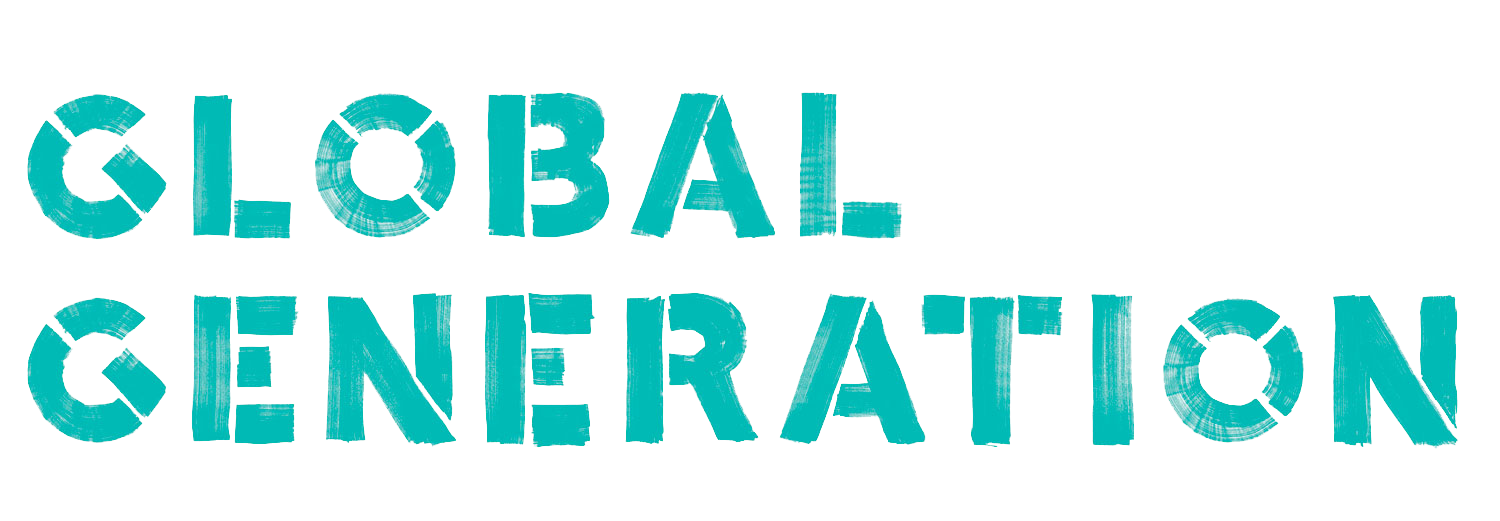
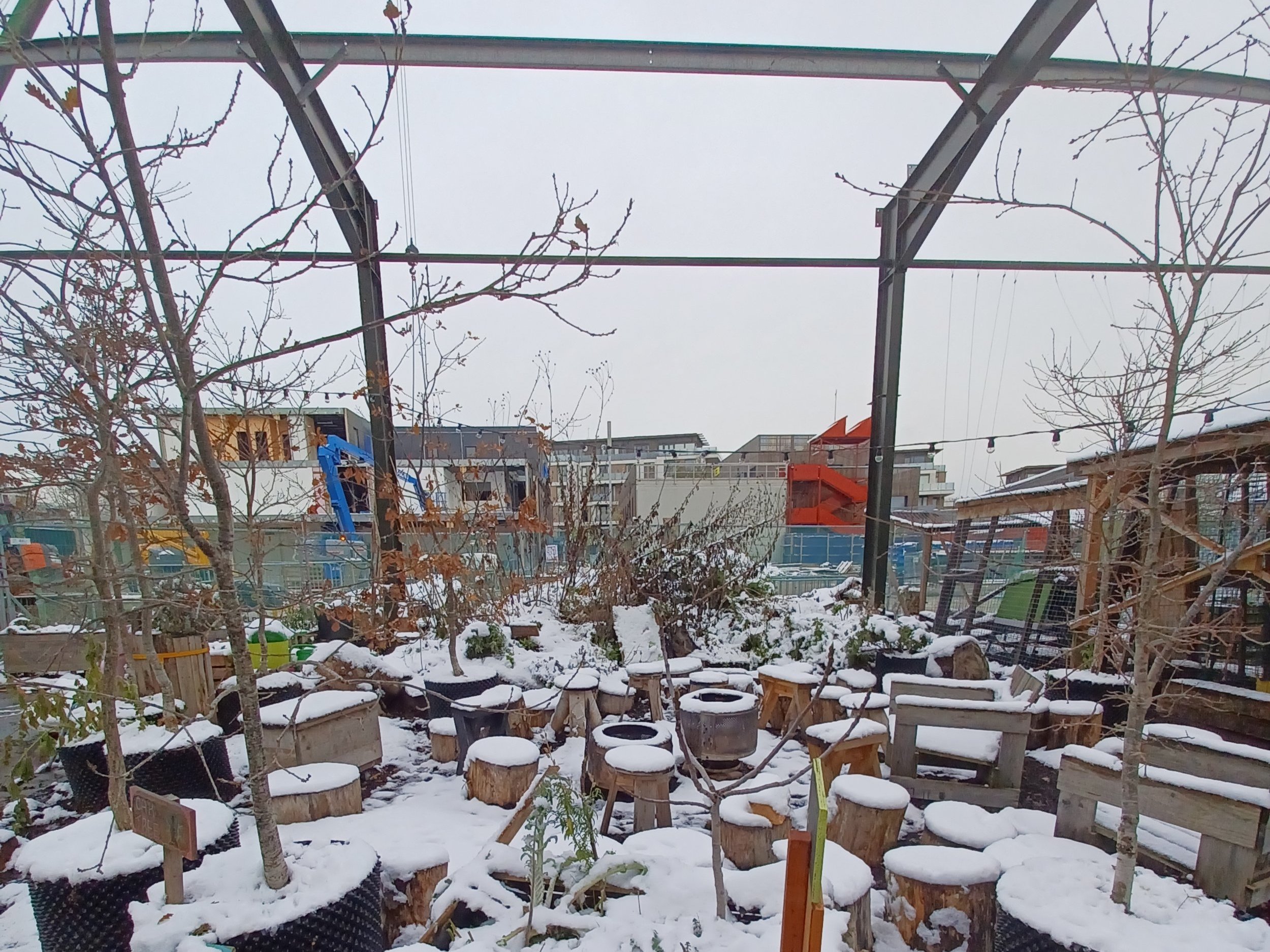


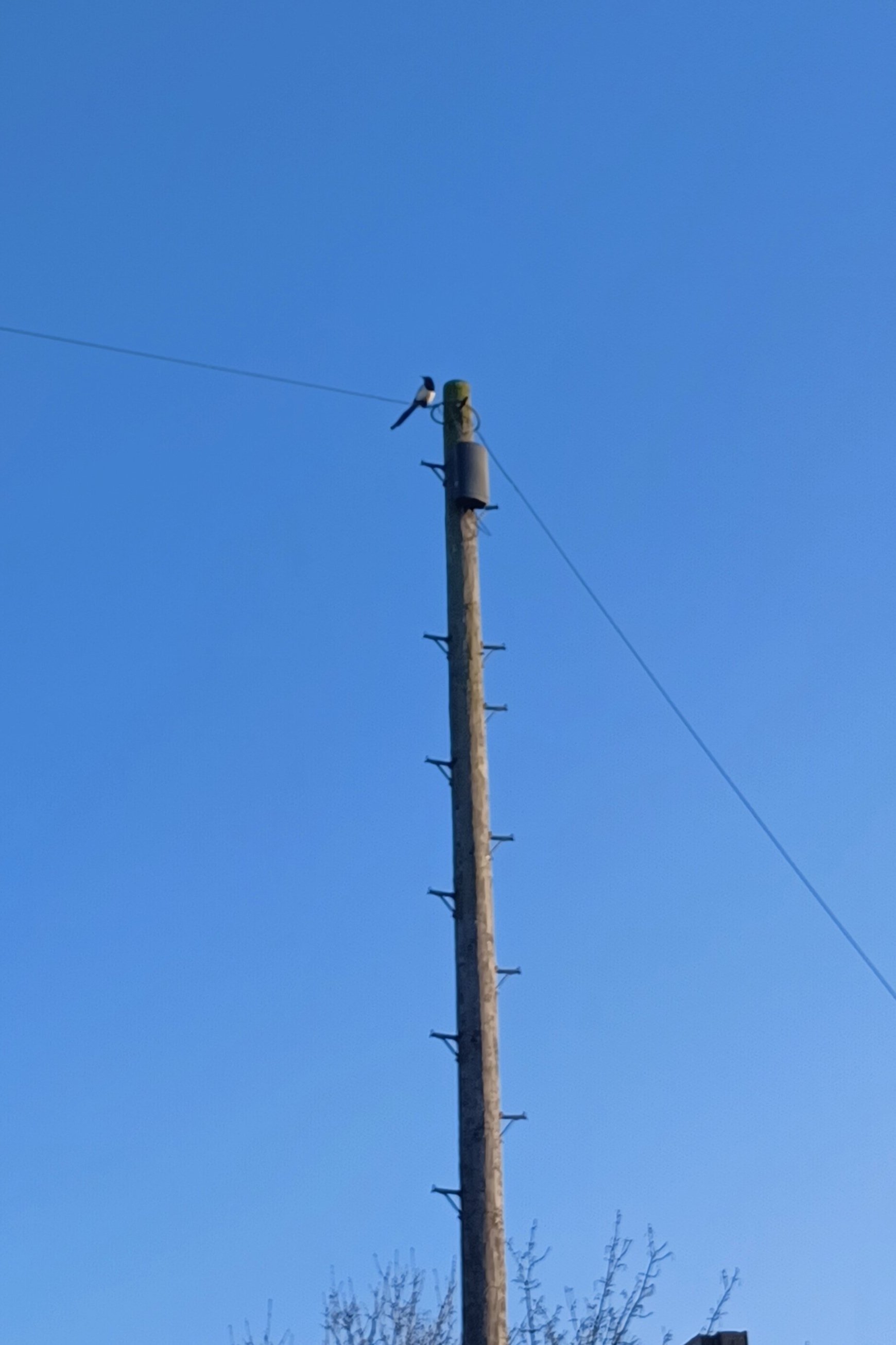
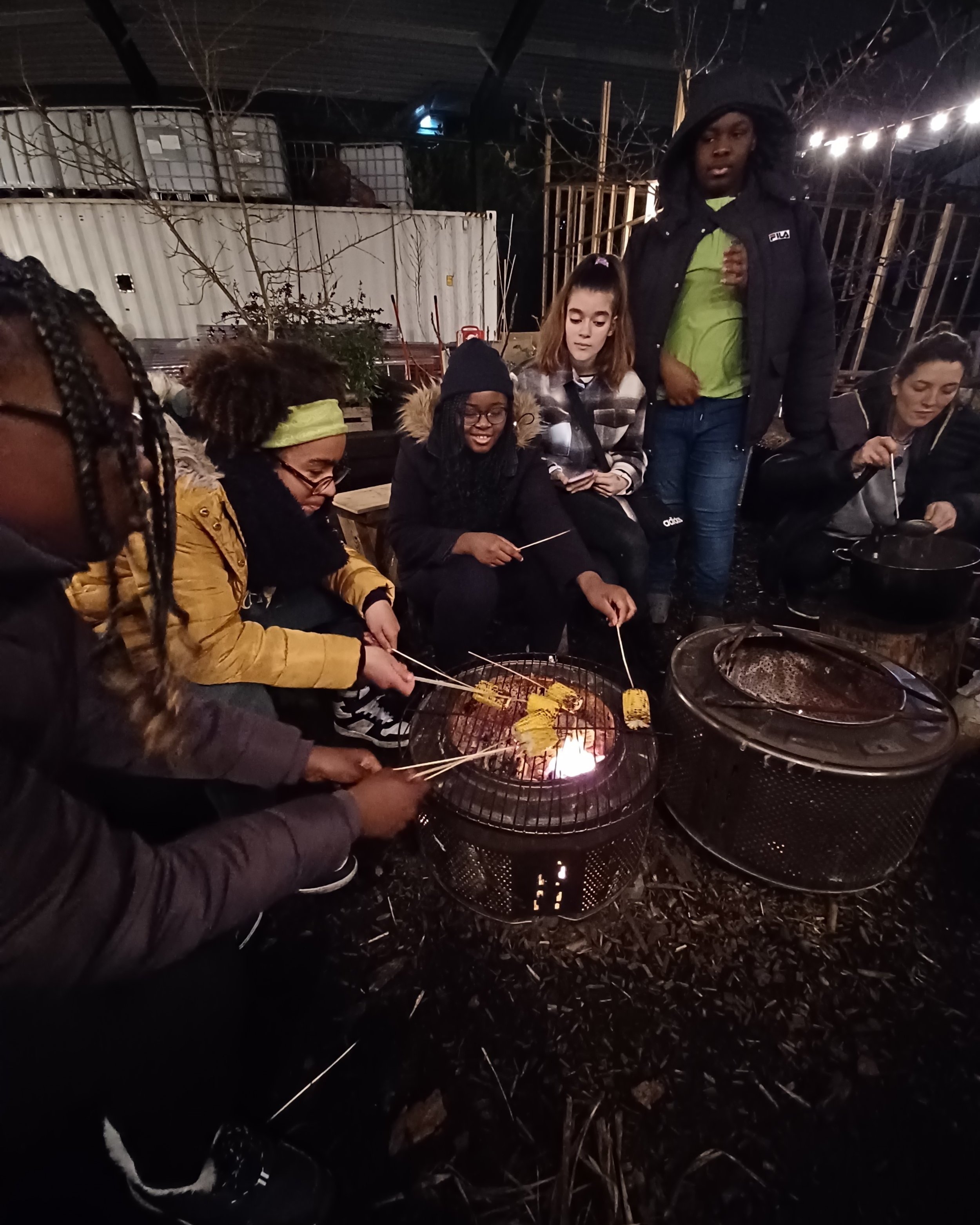

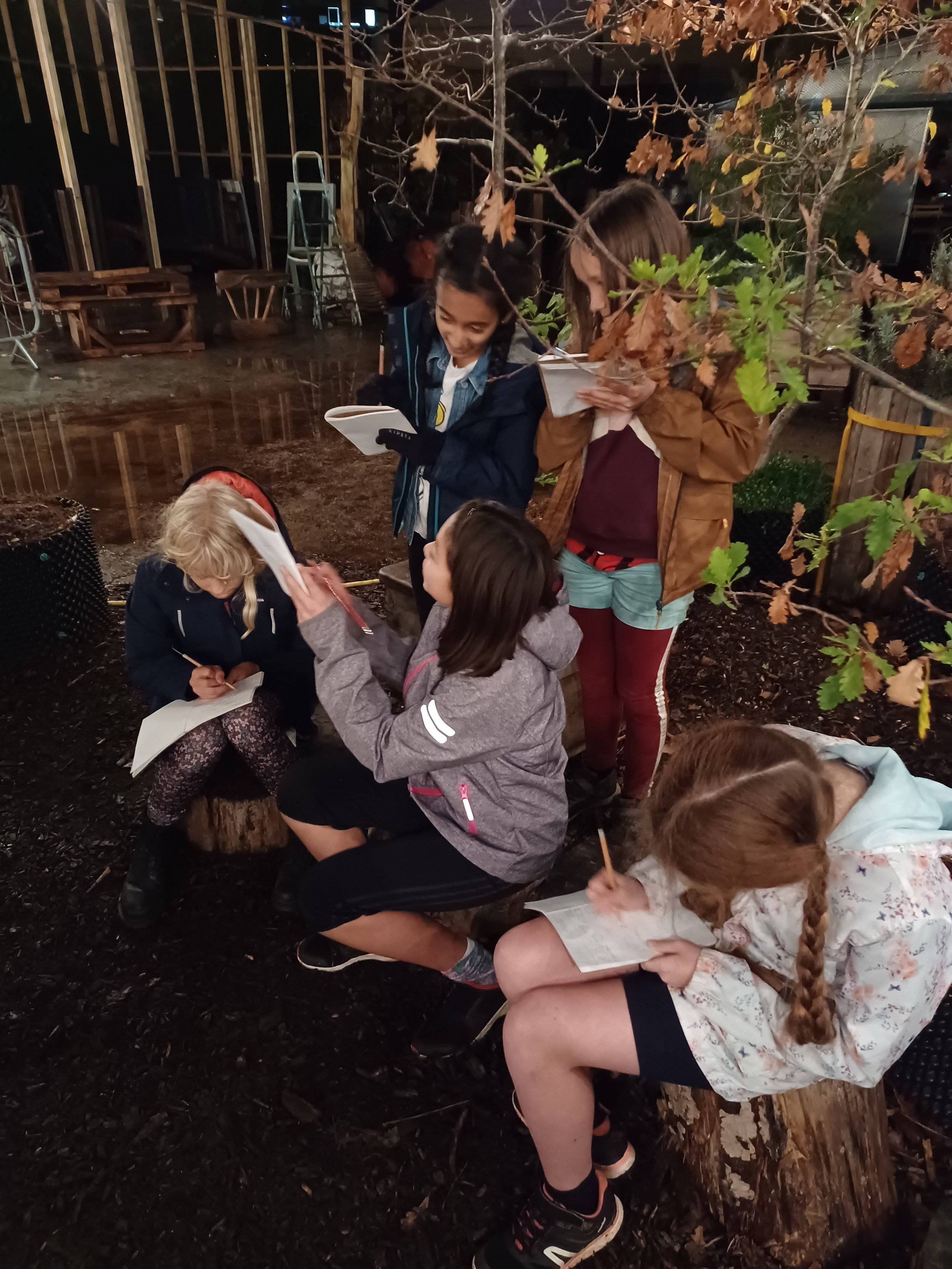
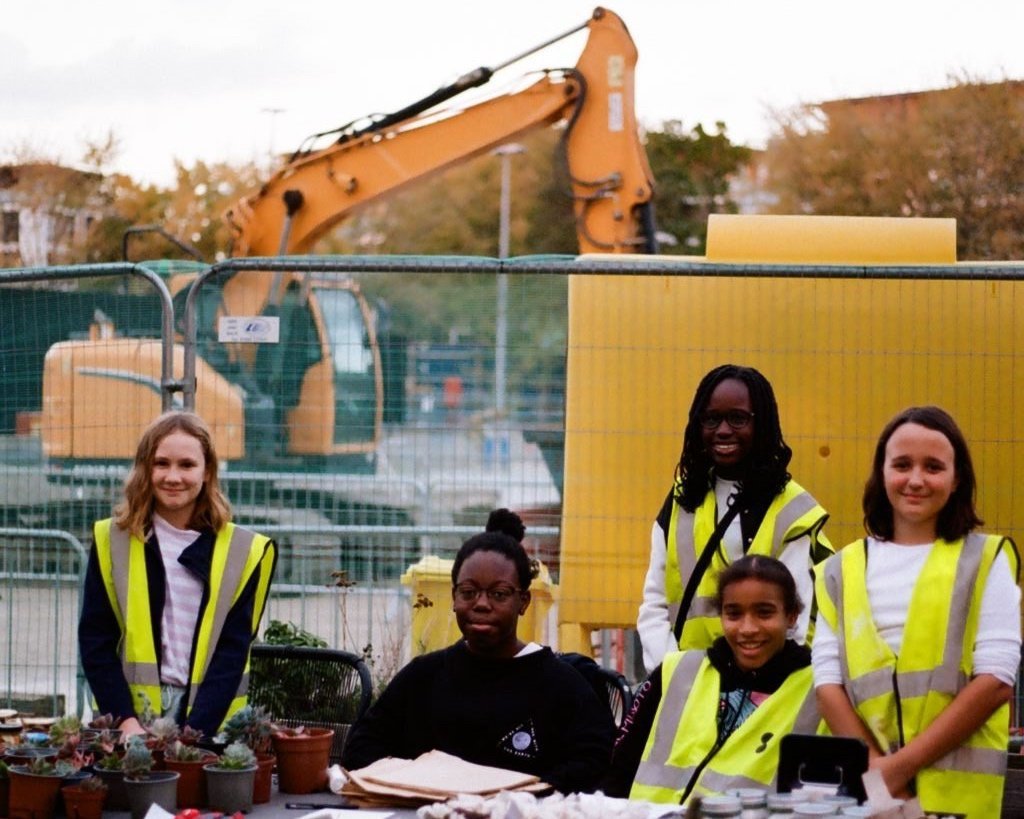
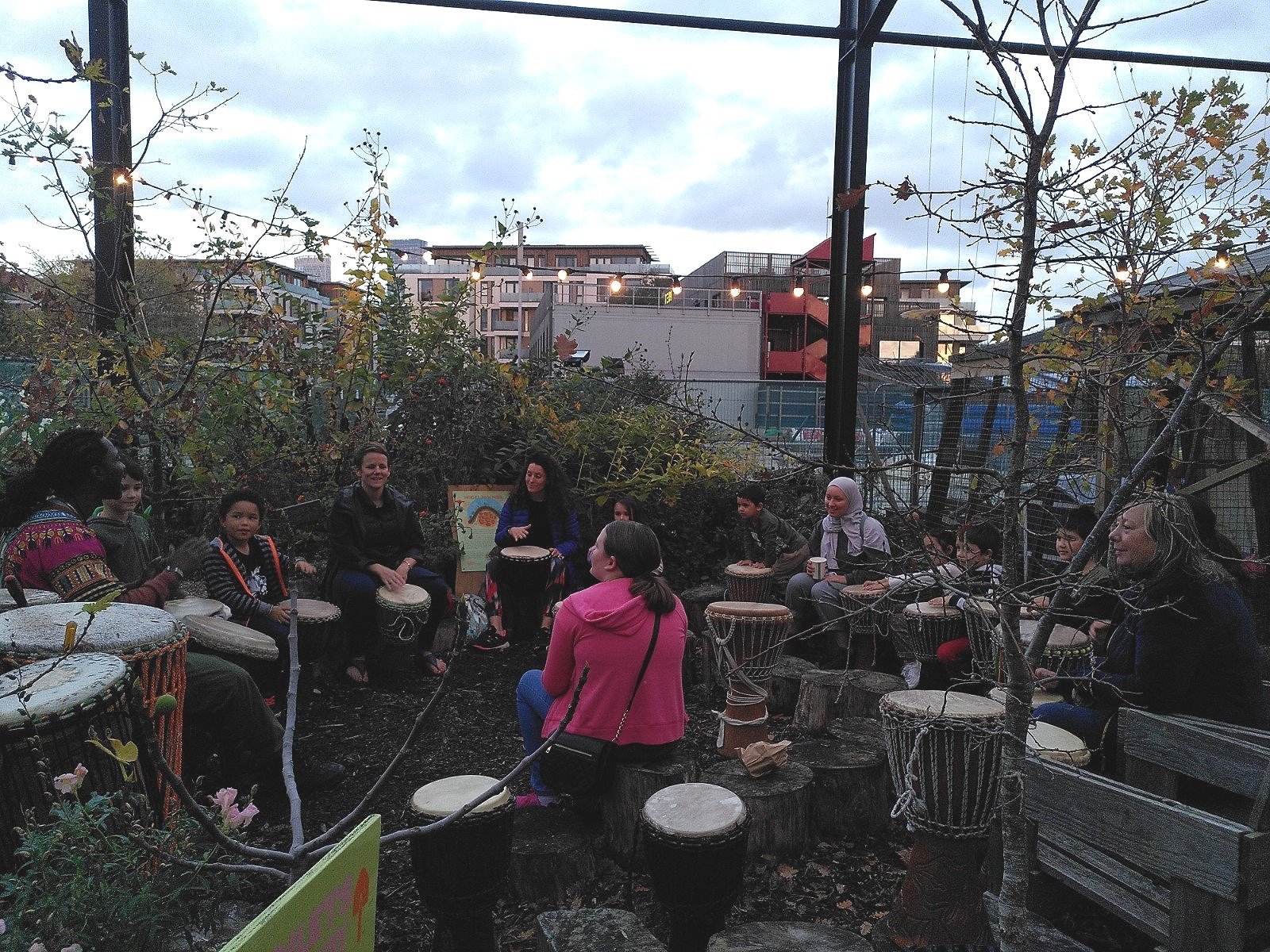


The everyday often gets overlooked, doesn’t it? We walk past spaces, objects, and people without a second thought—but these small, everyday moments hold the power to create real change.